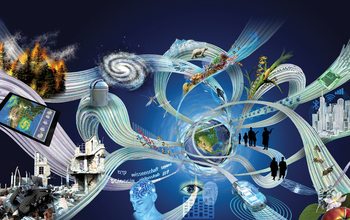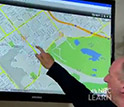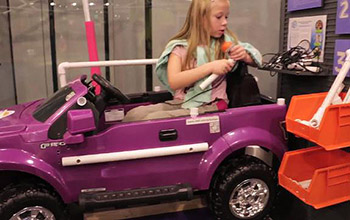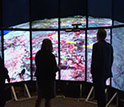Media Advisory 17-001
NSF to host ‘Arc of Science’ event on Capitol Hill
Media invited to join NSF Director France Córdova and NSF-funded researchers to learn how basic research benefits the U.S. economy, national security, U.S. global competitiveness
February 13, 2017
This material is available primarily for archival purposes. Telephone numbers or other contact information may be out of date; please see current contact information at media contacts.
On Feb. 15, the National Science Foundation (NSF) and the Coalition for National Science Funding (CNSF) will host "The Arc of Science: Research to Results," an event on Capitol Hill to highlight for new members of Congress and their staff some of the tangible impacts of federally funded basic research.
NSF Director France Córdova and Reps. Lamar Smith and Eddie Bernice Johnson of Texas will deliver remarks, with media invited to attend. With hands-on demonstrations, the event will showcase the kind of NSF-funded research that strengthens the economy, enhances national security and sustains the U.S. as a global leader in science and engineering.
NSF-funded researchers of all disciplines, accompanied by the individuals or groups benefiting from their research, will be on hand to demonstrate the real-world application of the research. Attendees can learn about the origins of Apple's MultiTouch technology, last year's breakthrough discovery of gravitational waves, technology that tracks first responders during emergencies when GPS is not available, and more.
Representatives from the Los Angeles Police Department, the Department of Veterans Affairs, the Federal Trade Commission and private industry will conduct demonstrations and talk about how NSF-funded research has translated into real world applications.
EVENT DETAILS:
| WHAT: |
The Arc of Science: Research to Results |
| WHO: |
List of exhibitors included below. With remarks by: |
| WHERE: | Rayburn House Office Building, Rooms 2043-2044 |
| WHEN: | Wednesday, Feb. 15, from 4:30 p.m. to 7 p.m. |
| RSVP: |
Please contact lisajoy@nsf.gov or bquade@nsf.gov to attend or schedule an interview. |
Refreshments will be served.
See below for a list of attending NSF-funded researchers, community partners and research beneficiaries, and their exhibits:
Array of Things.
Charles Catlett, University of Chicago; Luftwerk; Lane Technical College Preparatory High School
Get an early look at the future of smart and connected communities with sensors that collect real-time data to make Chicago and other cities more healthy, livable and efficient.
Collaborative Indoor Mapping Technologies.
Carole Politi, TRX Systems Inc.; Motorola Solutions
Experience state-of-the-art technology for first responders that locates, maps and tracks people and resources when traditional GPS is not available.
A Formula for Fighting Crime.
Andrea Bertozzi, University of California, Los Angeles; Los Angeles Police Department
Meet the mathematician and officer working together to prevent crime in one of the largest U.S. cites.
Go Baby Go!
Cole Galloway, University of Delaware; Cleveland Clinic
Meet the families and volunteers who modify electric toy cars for mobility-impaired children to give them active control over their own ability to explore.
LIGO Science Education Center Partnership: Time for a "Snack".
Luria Young, Southern University and A&M College; LIGO Science Education Center
Listen to the chirp of gravitational waves that traveled billions of light years across the universe and learn how the Laser Interferometer Gravitational-wave Observatory (LIGO) Science Education Center uses simple household materials to open up the universe to everyone.
MultiTouch: From Early Concepts to Mobile Revolution.
Wayne Westerman, Apple Inc.
Behold 20 years of MultiTouch technology that revolutionized today's touchscreens and changed how we interact with computers and each other.
Next-Generation Pathogen Detection.
Crystal Icenhour, Aperiomics Inc.; Virginia Bio
Walk through the process of pathogen identification and learn how researchers combine genomics and statistics to quickly identify multiple pathogens in a single test.
Ocean Acidification and the Early Life Stages of Oysters.
George Waldbusser, Oregon State University; Whiskey Creek Shellfish Hatchery
Explore the effects of ocean acidification on young oysters and learn how this research has revolutionized a multi-million dollar industry.
Privacy and Security People Can Use.
Lorrie Cranor, Carnegie Mellon University; Federal Trade Commission
Try to create an "uncrackable" password as you learn about developments in cyberspace privacy and security and how the FTC is using research findings to improve cybersecurity.
QSTORM: Achieving Pinpoint Surveillance Capacity Inside Living Cells.
Jessica O. Winter, Ohio State University; Museum of Science, Boston
Light up a few trillion quantum dots and see how this team-science story has become an inspiration for public audiences at the Museum of Science Boston and beyond.
The Robotarium: Remotely Accessible Swarm Robotics.
Magnus Egerstedt, Georgia Institute of Technology; University of Illinois at Urbana-Champaign
Watch small robots do big things and learn how researchers are performing advanced robotics research remotely.
3-D Immersive Tele-Rehabilitation.
Balakrishnan Prabhakaran, University of Texas at Dallas; VA North Texas Health Care System; Dallas VA Medical Center
Imagine yourself as doctor and patient as you experience next-generation care for veterans with advanced 3-D modeling, virtual and mixed reality and network techniques.
-NSF-
-
View Video
A computer model developed by a team at UCLA provides the LAPD with a new crime fighting tool.
Credit and Larger Version -
View Video
Modified toy cars allow mobility-impaired children to explore their environment.
Credit and Larger Version -
View Video
The NSF-supported WIFIRE initiative will better monitor, predict and mitigate wildfires.
Credit and Larger Version
Media Contacts
Brittany Quade, NSF, (703) 292-4675, email: bquade@nsf.gov
Lisa-Joy Zgorski, NSF, (703) 292-8311, email: lisajoy@nsf.gov
Related Websites
NSF LIGO Special Report: https://www.nsf.gov/news/special_reports/ligoevent/
The story of Whiskey Creek Shellfish Hatchery: https://www.youtube.com/watch?v=QLmhMPpN0X8
Veterans to get virtual rehab, GCN: https://gcn.com/Articles/2015/06/17/Virtual-rehab.aspx
Go Baby Go: NSF Discovery: https://www.nsf.gov/discoveries/disc_videos.jsp?org=NSF&cntn_id=138118&media_id=80319
Everything You Need to Know About Password Managers: http://www.consumerreports.org/digital-security/everything-you-need-to-know-about-password-managers/
Some iPhone touchscreen roots 'splained by FingerWorks inventors: https://www.engadget.com/2007/01/22/some-iphone-touchscreen-roots-splained-by-fingerworks-inventors/
Business Rx: Her challenge is turning a service into a product, Washington Post: https://www.washingtonpost.com/news/on-small-business/wp/2016/09/14/business-rx-her-challenge-is-turning-a-service-into-a-product/?utm_term=.fac1b241a57b
The U.S. National Science Foundation propels the nation forward by advancing fundamental research in all fields of science and engineering. NSF supports research and people by providing facilities, instruments and funding to support their ingenuity and sustain the U.S. as a global leader in research and innovation. With a fiscal year 2023 budget of $9.5 billion, NSF funds reach all 50 states through grants to nearly 2,000 colleges, universities and institutions. Each year, NSF receives more than 40,000 competitive proposals and makes about 11,000 new awards. Those awards include support for cooperative research with industry, Arctic and Antarctic research and operations, and U.S. participation in international scientific efforts.
Connect with us online
NSF website: nsf.gov
NSF News: nsf.gov/news
For News Media: nsf.gov/news/newsroom
Statistics: nsf.gov/statistics/
Awards database: nsf.gov/awardsearch/
Follow us on social
Twitter: twitter.com/NSF
Facebook: facebook.com/US.NSF
Instagram: instagram.com/nsfgov






